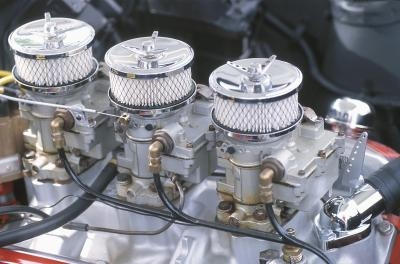
"Carburetors will become obsolete in seven to eight years." That's what Jim McFarland said in the February 2009 issue of Car Craft, and the auto industry has been echoing that sentiment for some time now, more than 20 years, in fact. While there may be newer and more sophisticated options, there may never be one to match the carburetor for versatility and performance at anything approaching its cost.
Above and beyond all else, the carburetor's trump card is its low cost of buy-in, maintenance and modification. Consider this: an Edelbrock 3520 Pro-Flo XT electronic fuel injection kit (complete with manifold, injectors and fuel pump) retails for about $3,900 as of October 2010 and can support about 450 horsepower. A comparable Edelbrock Performer RPM carburetor and intake manifold package capable of supporting the same horsepower will run you under $850. That epic price gap is fairly representative of the automotive aftermarket, where a full EFI (electronic fuel injection) package will typically run four to five times more than its carbureted equivalent.
On the high end, a carburetor re-jetting kit might cost you as much as $50; the average computer chip with a pre-installed fuel map costs more than $200. Here's what you get for your $200: a fuel map calibrated to exactly the specs that you gave the manufacturer without any margin for error when applied to future modifications. To change the program, you'll need to either send the chip back to the manufacturer or buy a tuner or tuning software for about $500. To adjust for modifications with a carburetor, you simply swap in a few new needle valves and jets from your kit.
The only difference in difficulty between tuning a carburetor and tuning an EFI system is that you can tune an EFI setup without ruining your manicure. But make no mistake: what difficulty EFI lacks in terms of manual labor it more than makes up for in complexity and a lack of margin for error. The carburetor's much-maligned lack of precision works to its benefit, increasing the margin of error far past what more finicky fuel systems could tolerate.
Electronic fuel injection was, in large part, developed to enhance the viability of smaller displacement, turbocharged engines in replacing the fuel-hungry V8s of decades before. While fuel injection is still better suited to this task than carburetors, modern engineering and advancements in carb design have made these mechanical fuel mixers quite competitive with fuel injection in terms of drivability, flexibility under boost and reliability. Quite aside from that, the aftermarket offers a number of electronic fuel enrichment systems that help to close the gap even further between carburetors and fuel injection systems.